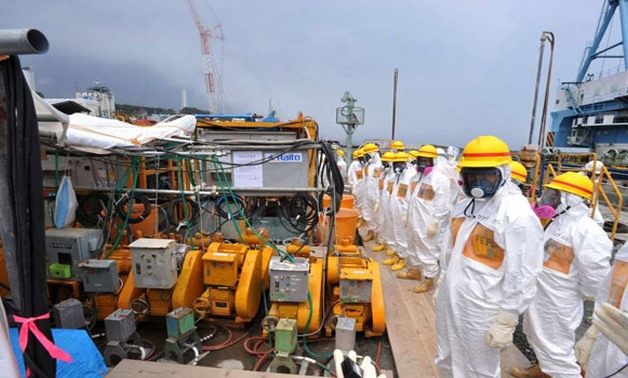
Japanese government officials and nuclear experts inspecting a facility to prevent seeping of contamination water into the sea at Tokyo Electric Power's (TEPCO) Fukushima Dai-ichi nuclear plant in Okuma, Fukushima prefecture on August 6, 2013. FILE PHOTO
Tokyo - 28 June 2017:Three former executives at Fukushima's operator stand trial this week on the only criminal charges laid in the 2011 disaster, as thousands remain unable to return to homes near the shuttered nuclear plant.
The hearing on Friday comes more than a year after ex-Tokyo Electric Power (Tepco) chairman Tsunehisa Katsumata, 77, and former vice presidents Sakae Muto, 66, and Ichiro Takekuro, 71, were formally charged with professional negligence resulting in death and injury.
The indictments are the first -- and only -- criminal charges stemming from the tsunami-sparked reactor meltdowns at the plant that set off the worst nuclear accident since Chernobyl in 1986.
"We hope the trial will shed light on where the responsibility for this accident...lies," Ruiko Muto, who heads a group that pushed for the trial, told AFP.
"The accident hasn't been resolved. There is nuclear waste from the cleanup efforts everywhere in Fukushima and there are still many unresolved problems," she said.
The trial follows a battle over whether or not to indict the Tepco executives.
Prosecutors had twice refused to press charges against the men, citing insufficient evidence and little chance of conviction.
But a judicial review panel composed of ordinary citizens ruled in 2015 -- for the second time since the accident -- that the trio should be put on trial.
That decision compelled prosecutors to press on with the criminal case under Japanese law.
"We want a verdict as soon as possible," Muto said.
"Some victims of this tragedy have died without seeing the start of the trial."
If convicted, the men face up to five years in prison or a penalty of up to one million yen ($9,000).
Tepco declined to comment on the trial, saying the men "have already left the company".
The three are reportedly expected to plead not guilty, and argue it was impossible to have predicted the size of the massive tsunami that slammed into Japan's northeast coast following a huge undersea earthquake.
However, a 2011 government panel report said Tepco simulated the impact of a tsunami on the plant in 2008 and concluded that a wave of up to 15.7 metres (52 feet) could hit the plant if a magnitude-8.3 quake occurred off the coast of Fukushima.
Executives at the company -- which is facing huge clean-up and liability costs -- allegedly ignored the internal study.
Waves as high as 14 metres swamped the reactors' cooling systems in March 2011.
Although the quake-tsunami disaster left some 18,500 people dead or missing, the Fukushima accident itself is not officially recorded as having directly killed anyone.
The charges against the executives are linked to the deaths of more than 40 hospitalised patients who were hastily evacuated from the Fukushima area and later died.
Around a dozen others -- including Tepco employees and members of Japan's Self Defense Forces -- were injured during the accident.
The disaster forced tens of thousands to evacuate their homes near the plant. Many are still living in other parts of Japan, unable or unwilling to go back home, as fears over radiation persist.
A 2015 report by the International Atomic Energy Agency said a misguided faith in the complete safety of atomic power was a key factor in the Fukushima accident.
It pointed to weaknesses in disaster preparedness and in plant design, along with unclear responsibilities among regulators.
A parliamentary report compiled a year after the disaster also said Fukushima was a man-made disaster caused by Japan's culture of "reflexive obedience".
An angry public pointed to cosy ties among the government, regulators and nuclear operators for the lack of criminal charges.
Campaigners have called for about three dozen company officials to be held accountable for their failure properly to protect the site against a tsunami.
The accident forced the shutdown of dozens of reactors across Japan, with just a handful online more than six years later.
Prime Minister Shinzo Abe and utility companies are pushing to get reactors back in operation, but anti-nuclear sentiment remains high and there is widespread opposition to the idea.


Comments
Leave a Comment